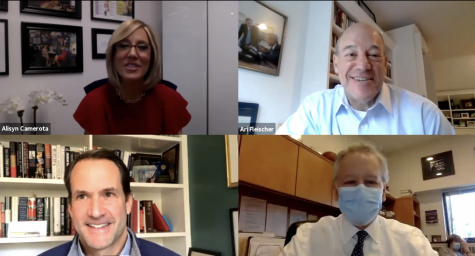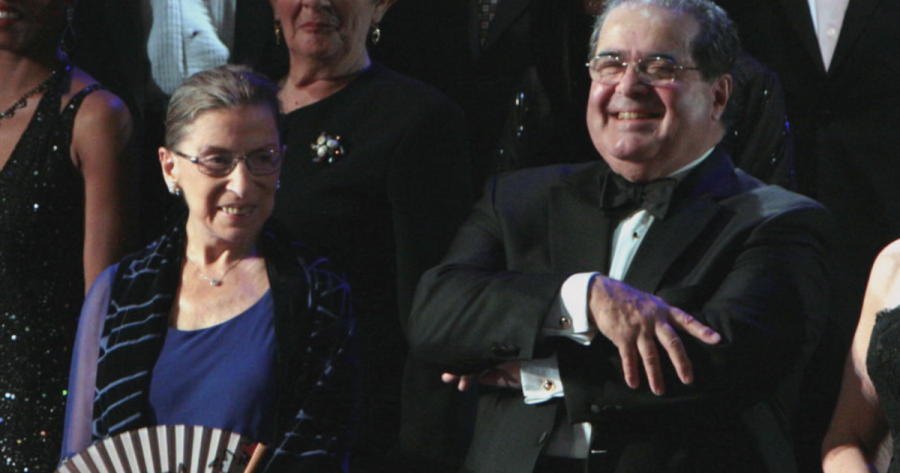A Call for Unity: Is it Attainable?
February 2, 2021
On October 12, 2020, Senate Judiciary Chair Lindsay Graham opened Supreme Court Justice nominee Amy Coney Barrett’s confirmation hearing by providing intriguing statistics regarding the Senate vote for Justices Ruth Bader Ginsburg and Antonin Scalia. Graham stated that left-leaning Ginsburg was confirmed as a Supreme Court Justice with a 96-3 Senate vote, with just about every Republican voting for her confirmation. Graham further commented that right-leaning Scalia received a 98-0 Senate vote, meaning that he won the favor of all Republicans and all Democrats alike. Graham went on to say, “I just want to remind everybody that there was a time in this country where someone like RBG was seen by almost everybody as qualified for the position of being on the Supreme Court, understanding that she would have a different philosophy than many of the Republicans who voted for her.”
In his inaugural address, President Joe Biden delivered a similar message of unity for all Americans. On January 20, 2021, in front of the U.S. Capitol, our newly inaugurated president stated that in order to overcome the challenges that our country faces and “to restore the soul and to secure the future of America …requires that most elusive of things in a democracy: unity.” President Biden reminded us that “with unity, we can do great things. Important things.” Our country can be more powerful if we put aside our different ideologies aside and are open to working together.
Senator Graham’s and President Biden’s comments struck me since, at the age of fifteen, my only experience with politics has been one in which there is deep-rooted divisiveness between the two political parties. Politicians rarely stray from their party lines when exercising their voting rights or expressing their political philosophies. Their messages made me ponder what it means to truly be united, and what each of us can do to help achieve this goal. Is unity in this country even possible, as it was when RBG and Scalia were confirmed to the Supreme Court? Or is that a bygone period of history?
I do believe that Biden’s call for unity is what the majority of Americans want. I also believe that most citizens of our great country would prefer to see a high-functioning government; where bipartisanship pushes our country forward by tackling the many issues that plague us today. However, as Biden mentioned in his speech, “I know the forces that divide us are deep and they are real.” Biden recognizes that it’s not enough simply to want unity; rather, it will take hard work to overcome the polarization that exists between the two opposing political parties.
In my limited years of following politics, the manner in which our political leaders act appears to be focused on, above all things, disparaging members of the opposing party. This childish behavior has only intensified over the past decade. I was only four years old during the State of the Union speech back in 2009, but was later told the story of the rudeness with which then South Carolina Representative Joe Wilson shouted, “You lie!” during President Barack Obama’s speech. In 2019, I watched the State of the Union address after which Speaker Pelosi tore up President Trump’s speech. These are just two examples, but there are so many more from Republicans and Democrats alike. Given this political environment, I expect the majority of elected officials will have trouble following through with President Biden’s plea for unity. The lack of decency from both parties sets a poor example that has sadly spilled over into the rest of the society.
Many of us have seen relationships impacted since the 2016 election when the world was shocked that Donald Trump defeated Hillary Clinton. People’s allegiances to their political parties intensified, and tensions formed based on the candidate one supported. Even in my sixth grade class (at a school other than St. Luke’s), the students all wanted to be part of one team or the other, and friendships began to evolve based on the political party that students sided with. As sixth graders, we did not fully understand issues or the political ramifications of the election, yet many of my classmates were extremely passionate about defending their ‘team’ and attacking the other.
The issue throughout our society, including with our politicians, is an inability to have civil discourse. At St. Luke’s, we are fortunate that civil discourse is woven into our curriculum and into our advisory CGL conversations. We have learned to listen respectfully to others and to seek to understand different perspectives. We recognize that diversity and differences of opinion should be celebrated, since they help us to expand our own knowledge and formulate our own opinions. In October, we were privileged to see civil discourse in action during the conversation between Congressman Jim Himes and former Press Secretary Ari Fleischer, expertly moderated by CNN anchor Alisyn Camerota. Witnessing the interaction between leaders from two different political parties was a tremendous learning experience. Unsure of what to expect from the conversation, and based on my previous experiences and assumptions, I expected the conversation to be more combative; I did not anticipate such civility, as the two articulate leaders had a conversation that would offer a glimmer of hope for President Biden’s call for unity. Both Himes and Fleischer delivered powerful messages regarding the importance of respectful dialogue with a person with an opposing view.

As Congressman Himes explained, “If I want to change a constituent’s mind or one of my colleague’s mind, if I go at that colleague or constituent and say ‘You’re wrong, the facts show you’re wrong,’ all I’ve done in that instance is pretty much guarantee that that person has dug in. They’re angry at me because I didn’t listen to them and treat them with some dignity–what I believe to be their wrong idea. If I just listen, the act of listening makes them feel respected, and now I have a little bit of credibility because I’ve respected this individual and haven’t forced them to dig in.”
Congressman Himes also stated, “As citizens we need to cultivate a humility of intellect. Even the smartest of us are often wrong.” Entering into a discussion with someone who has opposing views can cause stress and anxiety. Often, egos can get in the way of having a productive conversation when the focus is on proving oneself right and the other party wrong; this strategy can make you feel good for a moment when you prove your point, but will make it hard to move forward together. We can continue following this dangerous path that our divisive political leaders have set for us over the past few years, or, as Fleischer said, “We can be sensible. We can try to bring people together and practice kindness and being good to each other, which can be boring, but you’ll live a lot longer and happier that way. It all comes down to treating people well, treating people nicely and treating people with respect in every walk of life.”
So how can we, as individuals and as members of our St. Luke’s community, help our country become more united? We should seek to understand different perspectives and truly listen to one another. We should create safe environments where everyone is comfortable sharing their unique views and experiences with their classmates and teachers, without fear of being judged if their opinions are different than most. Rather than entering into a conversation trying to only prove your point, try understanding someone else’s way of thinking and what led them to that point. Hearing different opinions helps us think about issues differently and truly consider and evaluate our own opinions.
Consider Ruth Bader Ginsburg and Antonin Scalia, who shared a close friendship despite their different philosophies and ideologies. They saw one another as people and not as solely a representation of opposing ideas. Ginsburg even commented that being faced with Scalia’s opposing view made her a stronger Justice because it helped her form a stronger argument: “My opinion is ever so much better because of his stinging dissent.” Seeing an issue through another lens can help us break down barriers between two opposing ways of thinking.
Unity does not mean that all of us share the exact same views, but it does require us to find common ground to build upon so that we can forge stronger relationships. Building stronger relationships is essential if we want to work together to solve the issues facing our schools and our communities, even our nation. We are fortunate that at St. Luke’s we are given a platform to practice civil discourse, a skill which will be valuable in all our relationships throughout our lives. Whether on social media or in face-to-face conversations, we should seek to model proper civil discourse through our own words and actions. We can promote unity by treating others with civility and kindness, and we have the right to hold our political leaders to this same ideal.




